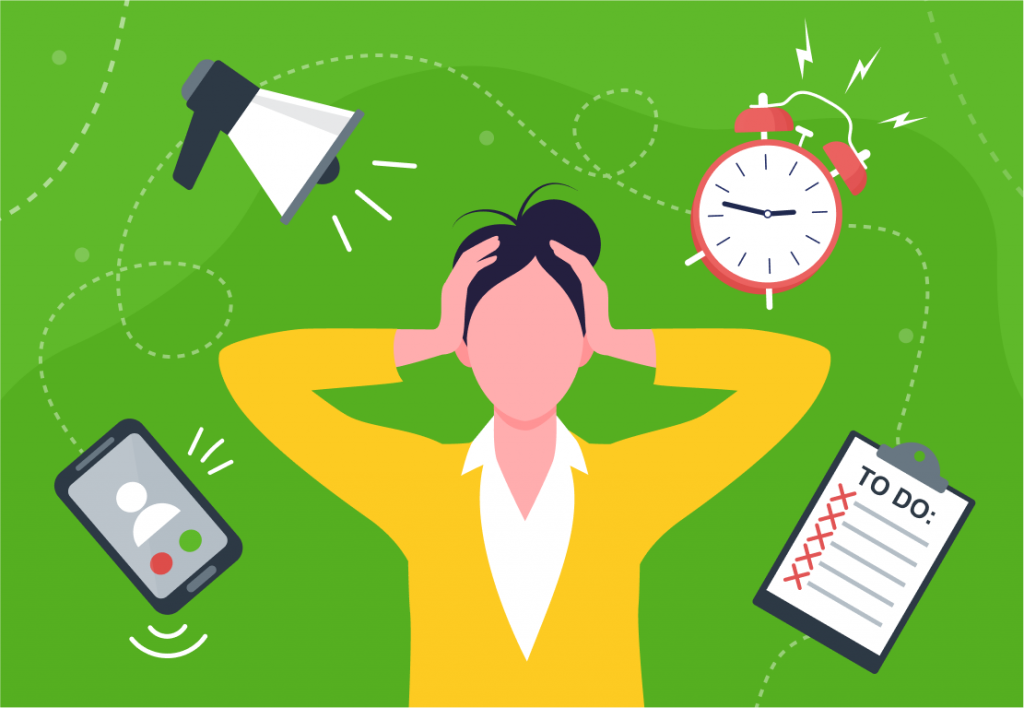What causes decision fatigue and how to protect yourself from it

Decision fatigue can affect all of us because we make a lot of decisions throughout the day – from mundane choices such as what to wear to more complex decisions about how best to approach work tasks.
Your decision-making capacity is not infinite. Making decisions is a cognitively demanding task and your ability to make good ones declines the more you have to make. A long session of decision making can leave you exhausted, leading you to make bad decisions – this is known as decision fatigue.
Want to get the most out of your time?
Try DeskTime for free!
Try free for 14 days · No credit card required.
By signing up, you agree to our terms and privacy policy.

In this article, we cover:
- What is decision fatigue?
- Why is it important to prevent decision fatigue?
- 3 ways how to avoid decision fatigue
- Parting remarks
What is decision fatigue?
To put it simply, decision fatigue is the exhaustion and reduced ability to make good decisions after a long sequence of decision making.
To give a common example of decision fatigue, think of grocery shopping. It’s a decision-intensive process—what will I cook, what products to buy, what brand to choose—and, by the time you reach the check-out register, it’s normal for decision making fatigue to set in. That’s why candy and snacks are often located near the register – you’re more likely to make an impulsive decision and buy yourself a treat because your decision-making ability has deteriorated.
Decision exhaustion can also affect work and manifest itself as a mini-burnout. People with decision fatigue typically have an impaired ability to evaluate options and often seek to avoid making decisions at all. This can lead people to act more impulsively or try to evade responsibilities, which can negatively impact their work lives.
Why is it important to prevent decision fatigue?
Beyond making worse decisions, sustained decision exhaustion can have further adverse effects: it can impact confidence in oneself, hamper productivity, and cause full-blown burnout. As such, it’s essential to recognize decision fatigue symptoms and take preventive measures to combat them before it becomes a problem.
This is particularly important given the global pandemic situation. A lot of the decisions we would make without thinking twice now require some reflection – should I visit my elderly relatives? Should I go into the office or work remotely today? How can I reduce my use of shared items? Should I call a meeting to discuss a work topic or should I just write an email?
These small things add up and, as a result, we have less mental bandwidth for other decisions, which can lead to underperformance at work and burnout. Indeed, burnout rates are on the rise, and two-thirds of workers say the pandemic has worsened employee burnout.
As such, preventing decision making fatigue can help improve employee well-being and productivity.

Want to keep your team happy?
Time tracking is a great tool to avoid employee burnout.
3 ways how to avoid decision fatigue
Steve Jobs famously wore the same few items of clothing every day to not waste brainpower on choosing an outfit each morning. Jeff Bezos looks to get all of his big decisions done before lunchtime and expects to only make 3 good decisions a day.
While decision exhaustion is difficult to eliminate entirely, there are certain steps anyone can take to minimize it and its impact. Here’s how to reduce decision fatigue.
1. Make fewer decisions
This is one of the most obvious yet powerful ways to fight decision making fatigue – reducing the total number of decisions you have to make. You can do this by automating what decisions you can and minimizing those you can’t.
Establishing routines and habits is one great way to go about it. By repeatedly doing things a certain way, you put your brain on auto-pilot. Whether it’s your morning routine or how you approach work, finding a process that works for you and sticking to it can alleviate having to constantly adapt and the decision making that comes with it.
Here are some ideas for freeing up your brain:
- Meal prepping – so you don’t have to think about what and where to eat;
- Automate mundane tasks – you can set up automatic processes for such tasks as paying bills or transferring money to your savings account;
- Dedicated timeboxing – you can set off a specific time window every day where you deal with things like email. This way you free up the rest of the day from related decisions.
Any and all activities that reduce your active involvement in making decisions are worth considering.
2. Give yourself time to think
Decision fatigue typically sets in after you have made multiple decisions in succession. When making a decision, you must consider various factors to choose the optimal path – it’s important to have the time to reflect on all options. If you pack several decision-intensive activities together, then you rob yourself of the opportunity to carefully consider each aspect, which causes you to make rushed choices, which, in turn, can lead to sub-optimal results.
So it’s a smart move to spread out your important decision-making activities or plan them ahead of time. Try to avoid multiple meetings in a row and leave yourself extra time to reflect when working on critical tasks.
In a similar vein, you can schedule your most difficult decisions for the morning. As the day goes on, your decision making capacity diminishes, and tackling the most important stuff first can help you put your best foot forward.
3. Recognize the symptoms of decision fatigue
Even just recognizing decision fatigue can be beneficial. It can push you to postpone demanding decisions for a time when you’re in a better position to make them, allowing you to make better choices about important topics. Don’t hesitate to respond with an “I’ll think about it and get back to you”!
If you notice that you’re tired, have had insufficient time to think about the decision at hand, or find yourself at the end of a long list of decisions, then it’s a great time to recognize that you’re prone to showing decision fatigue symptoms.
Parting remarks on decision making fatigue
Whenever you feel that you might be experiencing decision making fatigue, remind yourself – it’s not something negative or a failing on your part. It’s a natural psychological phenomenon that even the most successful people in the world take seriously and you should too.
Learning how to reduce decision fatigue and taking preventive measures to avoid it can improve your professional performance and personal well-being.
Did you find this article useful? Give it a clap!
Psst! You can clap more than once if you really loved it 🙂